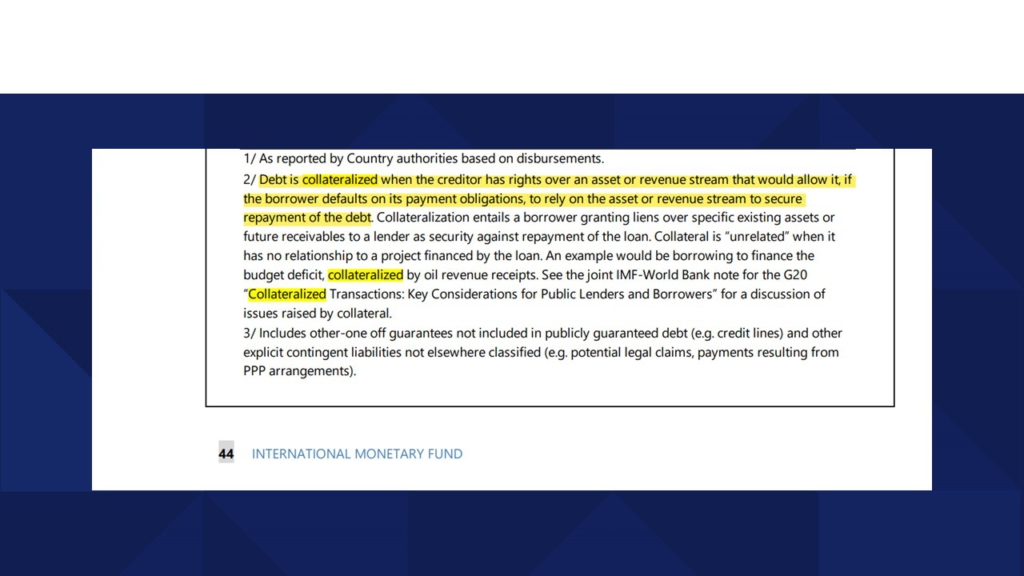The International Monetary Fund (IMF), has revealed details about how Ghana's four collateralized loans from China have exposed the country to the possibility of losing parts of its mineral resource revenue in addition to electricity sales in the future.
For Ghana, Chinese loans have been a reliable funding source for major projects since the year 2000. In two decades, Accra has racked up close to $5 billion from at least 41 Chinese loans.
After several years of near-unbridled borrowing, Ghana is now debt-trapped and wading through its worst economic crisis in a generation, with a current external debt portfolio exceeding $30 billion.
In a lot of debt negotiations taking place within the developing world, China appears to be the most important party at the negotiation table. Although it is the largest bilateral lender in the world, it is opaque about its lending policies and how it renegotiates with distressed customers.
According to the World Bank, the planet’s poorest countries faced $35 billion in debt-service payments to official and private sector creditors in 2022, of which 40% was due to China alone.
JoyNews’ checks show the West Africa nation has contracted at least 8 collateralized loans from China with different mineral resources as security against default. As at the end of 2022, Ghana owed China $1.9 billion, out of which $619 million were collateralized loans.
According to the Fund, Ghana’s collateralized debt as of the end of 2022, was entirely held by China, this corresponds to four loan agreements signed in 2007-18 that amount to US$619 million to finance infrastructure projects. These loans are collateralized against commodity production (cocoa, bauxite and oil) and electricity sales.
The loan agreement means in the event Ghana defaults on honouring its debt obligation, China has the right to use proceeds from Ghana’s oil, cocoa, bauxite or even the sales from electricity to settle the debt.

“Collateralized debt is any contracted or guaranteed debt that gives the creditor the rights over an asset or revenue stream that would allow it, if the borrower defaults on its payment obligations, to rely on the asset or revenue stream to secure repayment of the debt” the IMF stated.

The IMF has stressed that “statutory funds will not be allowed to collateralize revenue streams and issue debt. No objection certificates will not be issued to any statutory fund by the governing authority in this regard.”
The Fund has also requested that government provides corresponding loans/ derivatives for all encumbered assets used as collaterals.
Latest Stories
-
Mobus CEO apologises to Nigerian Police over Abuja land row, distances firm from protest at Nigerian High Commission in Accra
1 hour -
Experts urge institutionalisation of evidence-based health policies in Ghana
2 hours -
Government to convert National Cathedral site into National Cultural Convention Centre
2 hours -
Former Sports Minister Mustapha Ussif loses sister
3 hours -
Ayoum community appeals for fixing of collapsed bridge to ease commuting
3 hours -
Full text: Mahama’s speech at the Post-Election Evaluation Dialogue
3 hours -
Kumasi: 545 police personnel pass out to support 24-hour economy
3 hours -
No Ghanaian child will be denied tertiary education because of fees – Mahama
3 hours -
Ghana, U.S. reaffirm strategic ties at 249th Independence Day celebration
3 hours -
Full text: Mahama’s speech at launch of No Fees Stress policy
4 hours -
President Mahama promises justice for electoral violence victims
4 hours -
JoyNews Impact Maker awardee nominated for Global Citizen Waislitz Award, vote for him to win $100,000
4 hours -
Partey has fully cooperated with police throughout three-year investigation – Lawyer Jenny Wiltshire
6 hours -
Thomas Partey denies all the charges against him – Partey’s lawyer Jenny Wiltshire
6 hours -
Labena unveils new album “Life in Roses” at Bayview Village
6 hours

